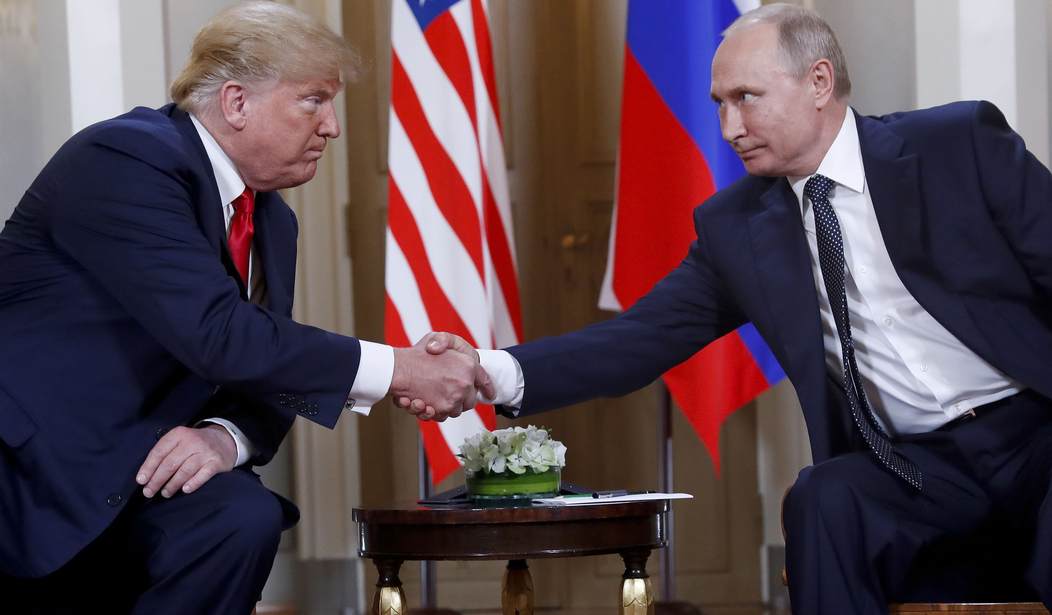Under the Trump administration, it seems every meeting or statement by the president is the most ‘destabilizing attack on our democracy’ yet, at least if you were to follow some of the diehard anti-Trump media.
Obviously President Trump’s conciliatory public tone towards the Russians at the Helsinki Summit is not the right diplomatic move at this sensitive time for U.S.-EU/NATO relations, as the trade disputes seem to be causing some collateral diplomatic challenges as well.
In foreign relations wordplay remains essential. Often U.S. leaders have used such joint-press conferences with the leaders of bad actors to publicly condemn their human rights abuses or other nefarious activities to their leader’s face, often with great effect in convincing the leader to shift their actions.
As usual, however, the hysterical overreaction by some on the far-left in calling it “treasonous” poisons the well of our discourse again in a way that reminds us why thankfully we are a republic and not a democracy where such momentary spurs and hyperbole might actually translate into national security or foreign policy.
Let’s look at the facts. Since President Trump took office the U.S. executive branch and U.S. Congress have taken an affirmative and active defensive stance against Russian aggression through a combination of arming the Ukrainians, increasing real and devastating sanctions on key members of the Russian ruling class, and intervening in Syria and successfully countering Russian military operations there (including with seemingly hundreds of Russian soldiers killed by U.S. forces).
Recommended
It is worth noting that this all stands in stark contrast to years of the Obama administration’s “reset button” with Russia and “red line” in Syria allowing the Ukrainian and Syrian crises to balloon, thereby allowing Russia to now gain many international footholds from which it is very difficult to dislodge them from.
Nonetheless, as the bipartisan condemnation and congressional Republicans’ reaction to the president’s summit shows, the president undoubtedly made a relatively serious diplomatic mistake in bending a knee rather than standing up to Putin when face-to-face.
On a more America-centric perspective, a particular point of contention at the summit was how the president seemingly denied Russian interference in the 2016 presidential election in contradiction to the near unanimous opinion of our intelligence agencies and general overwhelming evidence from tech companies, the legislative branch, and elsewhere.
Indeed it was unfortunate that the president made such a statement and for the past several days he has been walking it back, making it more affirmatively clear that he accepts our intelligence agencies’ conclusion that Russia dared to attack our country in the 2016 election.
To many ordinary Americans this focus on the precise wording of summits and press conferences must seem an exercise in useless futility, as it does not seemingly materialize in actual policy.
However, as previously mentioned, in diplomacy words are essential to a great degree. Words signal to parties on a wide scale the intentions of a country or person in terms of how they are trying to position themselves in the world. Words create the opening, backing, and credibility that pre-empts policy shifts and reversals.
Private communications and relationships fill in the holes but in the end the public dance is the record from which all go on in our more trust and diplomacy-based modern world system.
Russia at the moment remains a hostile and illiberal regime that has been consistently in recent years operating against U.S. interests across the world and seemingly even had the bravado to attack us so brazenly on our home soil in one of our most sacred processes.
For that they deserve little but spite and a fierce dash of American strength, particularly as by every metric – militarily, economically, and otherwise – they remain far below our country in a fashion immensely different from the Cold War besides our similar oppositional stance.
I hope President Trump will be clear in his stand for American values and human freedom, particularly to bad actors such as Putin’s Russia who will only be emboldened by weakness. It seems like a movie cliché to say that such a regime only respects strength and power but given that is how the former KGB Colonel leads his nation it is undoubtedly similar to how Putin operates in the world.
Furthermore, bending a knee towards Putin’s Russia shakes the resolve of our numerous allies across the world that stick with the United States because they trust in our world leadership and assertive strength.
Freedom was won at a hard cost in many of these countries. Telling a man like President Putin to his face his crime is no great challenge in comparison – and it is the duty of the leader of the free world.

























Join the conversation as a VIP Member